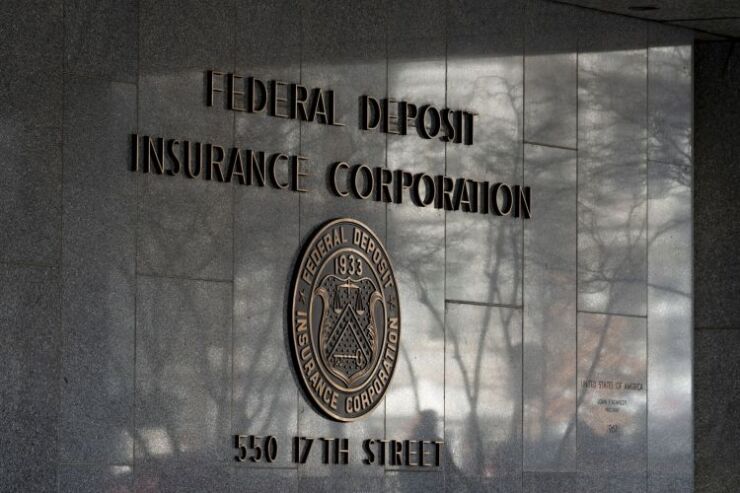WASHINGTON — The Federal Deposit Insurance Corp. issued five cease-and-desist letters on Friday telling five cryptocurrency-related companies to stop making false and misleading statements about the availability of deposit insurance for their customers.
The FDIC announced Friday afternoon that it had directed five companies behind certain crypto websites — including FTX US, Cryptonews.com, Cryptosec.info, SmartAsset.com and FDICCrypto.com — to "take immediate corrective action to address false or misleading statements" concerning whether their customers' funds were insured by the federal agency.
Under the Federal Deposit Insurance Act, the FDIC has the authority to prohibit use of the agency's name or logo to imply customer funds are government insured when they are not. Each of the letters — which were signed by FDIC assistant general counsel Seth Rosebrock — noted that the FDIC had the authority to assess civil money penalties as well.

"Based upon evidence collected by the FDIC, each of these companies made false representations — including on their websites and social media accounts — stating or suggesting that certain crypto-related products are FDIC-insured or that stocks held in brokerage accounts are FDIC-insured," the agency said in a press release. "In one case, a company offering a so-called cryptocurrency also registered a domain name that suggests affiliation with or endorsement by the FDIC."
The orders follow a similar one issued against Voyager, a cryptocurrency company that went bankrupt in July, after customers scrambled to understand what would happen to their dollars held by a partner bank after the crypto firm promised those deposits were FDIC-insured. The FDIC said the way the arrangement was presented to customers was misleading.
The agency has also
One of the companies, FTX US, is the U.S. arm of one of the largest crypto exchanges in the world. In July, president of FTX US Brett Harrison said on Twitter that t
"These false and misleading statements represent or imply that FTX US is FDIC-insured, that funds deposited with FTX US are placed, and at all times remain, in accounts at unmanned FDIC-insured banks, that brokerage accounts at FTX US are FDIC-insured, and that FDIC insurance is available for cryptocurrency or stocks," the FDIC said in its letter to FTX US. "In fact, FTX US is not FDIC-insured and the FDIC does not insure any brokerage accounts, and FDIC insurance does not cover stocks or cryptocurrency."
The letter tells FTX US to immediately remove any and all statements that suggest otherwise.
Asked for comment, representatives for FTX US directed American Banker to a
"We really didn't mean to mislead anyone, and we didn't suggest that FTX US itself, or that crypto/non-fiat assets, benefit from FDIC insurance," Harrison said. "I hope this provides clarity on our intentions."
The agency took particular issue with FDICCrypto.com, which redirects customers to a separate website apparently maintained by company called CH's Service Provider, which otherwise describes itself as a transportation service in Pennsylvania. The FDICCrypto.com domain redirects viewers to chsserviceprovider.com/cryptocurrency, a page that as of publication time promises "transactional freedom" and "exponential industry growth."
"By utilizing the domain name
For SmartAsset.com, the FDIC zeroed in on a recent article published by the crypto company on its website listing a number of "FDIC-insured crypto exchanges," which the agency said in its Friday letter "appears to contain false and misleading representations" about deposit insurance.
"In fact, the FDIC does not insure any cryptocurrency exchanges; FDIC insurance does not cover cryptocurrency; the FDIC only insures deposits held in insured banks and savings associations," the letter said.
The FDIC presented a bullet-point list of similar complaints to Cryptonews.com, which the agency blasted for claiming that the crypto exchange Coinbase was "one of the few exchanges" "actually regulated and insured by the FDIC" — a claim the website loosely echoed for crypto firms eToro, Gemini, and Crypto.com.
"These bullets are merely examples of the misrepresentations regarding FDIC Deposit Insurance that can be found on Cryptonews," the FDIC's letter said, "and these bullets should not be taken as an exhaustive list of such statements."
For Cryptosec.info, the FDIC identified another page that falsely listed "FDIC-insured Crypto Exchanges," noting that the page "prominently displays the FDIC's official seal."
For each of the letters, the FDIC directed the recipients to respond within 15 days acknowledging the receipt of the agency's correspondence. The FDIC also told the firms to provide "information and documentation supporting the basis for your belief in the accuracy" of their statements regarding crypto-related deposit insurance, if they so wished.
"Failure to respond to this letter may result in the FDIC taking appropriate action as authorized by the Federal Deposit Insurance Act," the letters said.






